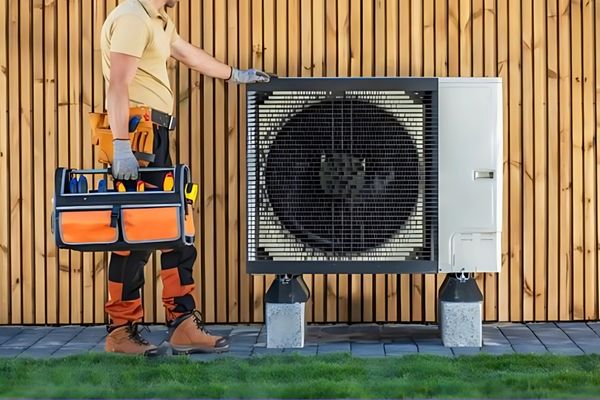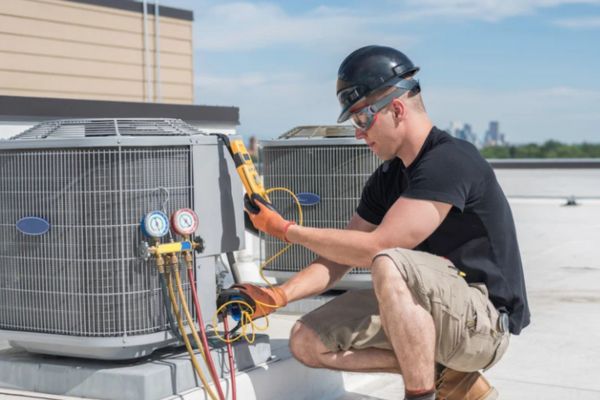A reliable HVAC system is vital for maintaining year-round comfort in your home, but navigating the costs of installing or replacing one can often feel overwhelming. With so many factors at play—like system type, home size, energy efficiency, and even regional labor rates—it’s easy to feel unsure about what to expect.
That’s where we come in to help. Using an HVAC cost calculator, you can get a clear and accurate estimate tailored to your specific needs, taking the guesswork out of budgeting for your project. We’re here to guide you through the process, explain how these calculators work, and break down the factors that influence HVAC pricing. With our help, you’ll have the tools and insights you need to make an informed decision, ensuring your home’s comfort without unexpected surprises. Let’s work together to simplify the process and get you the answers you need.

What is an HVAC System?
Outdoor HVAC unit installed beside decorative plants.
An HVAC system is crucial for regulating your home’s temperature and air quality, providing heating, ventilation, and air conditioning throughout the year. These systems ensure your living space stays comfortable no matter the weather outside.
Key Components of HVAC Systems
- Heating: Usually through furnaces or heat pumps, keeping your home warm during colder months.
- Ventilation: Ensures proper air circulation, reduces indoor air pollutants, and controls humidity.
- Air Conditioning: Cools your home during hot weather, maintaining a comfortable indoor climate.
Types of HVAC Systems
- Central Air Systems: Common in many homes, these systems distribute air through a network of ducts.
- Heat Pumps: Offer heating and cooling, making them an efficient all-in-one solution.
- Ductless Systems: Provide targeted heating or cooling without requiring ductwork, which is ideal for smaller spaces.
Each system type varies in cost, efficiency, and suitability for different home layouts, making it essential to choose the right one for your needs.

Factors That Affect HVAC Costs
Person budgeting with cash, a calculator, and a notebook.
The cost of installing or replacing an HVAC system can vary widely depending on several factors. Understanding these elements can help you get a more accurate estimate and make better decisions when planning your project.
1. Type of HVAC System
The type of system you choose has a significant impact on cost. Central air systems tend to be more expensive than ductless systems. At the same time, heat pumps, which offer heating and cooling, can have higher upfront costs but may save money over time with increased energy efficiency.
2. Size of Your Home
The larger your home, the bigger the HVAC system you’ll need. This directly affects both the price of the equipment and the installation. Homes with more square footage require more powerful systems to maintain consistent temperatures, which increases costs.
3. Labor Costs
Labor costs vary based on your location, the complexity of the installation, and the contractor’s rates. In regions with higher labor costs, the total price of an HVAC installation will be higher. Replacing an old system or installing a new one in a home without existing ductwork can also increase labor costs.
4. Energy Efficiency Ratings
Higher-efficiency HVAC systems typically cost more upfront, but they offer long-term savings on energy bills. Systems with a higher SEER (Seasonal Energy Efficiency Ratio) rating use less energy to operate, reducing your monthly utility costs. While the initial investment is higher, it pays off through lower ongoing expenses.
5. Additional Features
Features such as smart thermostats, zoning systems, and enhanced air filtration can increase the overall cost of your HVAC system. These upgrades provide added convenience and performance but come at an extra cost.
Understanding these factors can help you better estimate the total cost of your HVAC system, ensuring you stay within budget while getting the most out of your investment.

How an HVAC Cost Calculator Works
An HVAC cost calculator is a helpful tool that helps homeowners estimate the cost of installing or replacing an HVAC system. By inputting specific details about your home and preferences, the calculator provides an estimate to guide your budgeting decisions. Here’s how it works:
1. Input Information
The first step is entering key details about your home and HVAC needs, such as:
- Home Size: The square footage of your home is essential for determining the size and type of HVAC system required.
- Type of System: You’ll choose the system you’re interested in (e.g., central air, heat pump, or ductless system).
- Efficiency Preferences: You can specify whether you want a standard or high-efficiency system.
2. Cost Estimate
Based on the input, the calculator generates an estimated cost. This includes:
- Equipment Costs: The price of the HVAC unit itself varies depending on the system type and efficiency.
- Installation Costs: Estimated labor fees, which depend on factors like the complexity of the installation and local rates.
- Additional Costs: Possible expenses for upgrades, new ductwork, or permits.
3. Comparison of Options
Many calculators allow you to compare different system options. For example, you can see how costs vary between a standard and high-efficiency unit or between central air and ductless systems. This comparison helps you make informed decisions based on both upfront costs and long-term savings. An HVAC cost calculator can simplify your planning process, helping you understand what to expect and avoid surprises when getting quotes from contractors.
Typical HVAC System Costs
Now that you understand how the cost calculator works, it’s important to have a general idea of the typical costs involved in HVAC installation or replacement. Here’s a breakdown of average prices for different HVAC systems and related expenses.
1. Average Costs by System Type
The cost of an HVAC system varies based on the type of system you choose. Here are some typical price ranges for common systems:
Central Air Conditioning Systems
$3,000 – $7,500
Central air systems are one of the most popular options, providing consistent cooling throughout your home via ductwork.
Ductless Mini-Split Systems
$2,000 – $10,000
These systems offer flexibility and energy efficiency, ideal for homes without existing ductwork.
Heat Pumps
$4,000 – $8,000
Heat pumps provide heating and cooling, making them an efficient choice, especially in mild climates.
Furnace Systems
$2,500 – $6,500
Furnaces are typically used for heating in colder climates, with natural gas systems being the most common.
2. Installation Costs
Installation costs can vary significantly depending on factors such as the complexity of the job, your home’s layout, and local labor rates. You can expect to pay between $1,200 and $5,500 for installation. Homes with existing ductwork generally see lower installation costs, while homes that require new ductwork will face higher expenses.
3. Energy Efficiency and Long-Term Savings
Investing in a higher-efficiency system may increase the upfront cost but can save you money in the long run through lower energy bills. For example:
- Standard Efficiency Systems: Lower initial costs but higher energy consumption.
- High-Efficiency Systems: Higher upfront costs but lower energy usage, which can result in long-term savings. Look for systems with a high SEER rating (Seasonal Energy Efficiency Ratio) for better efficiency.
4. Maintenance and Other Costs
Beyond installation, there are ongoing costs to consider, such as:
- Regular Maintenance: Expect to pay between $100 to $300 per year for routine servicing to keep your system running smoothly.
- Repairs and Replacements: Over time, parts of your HVAC system may need repair or replacement. On average, minor repairs can cost between $150 and $500.
By understanding these typical costs, you can better budget for your HVAC project and make informed decisions about which system best fits your home and budget.
Additional Tips for Budgeting Your HVAC Project
Proper budgeting is essential when planning an HVAC installation or replacement. Beyond using an HVAC cost calculator, there are additional steps you can take to ensure you’re prepared for any unexpected expenses and to get the best value for your investment.
1. Plan for Unforeseen Expenses
It’s important to set aside extra funds for potential unexpected costs that may arise during the project. These can include:
- Ductwork Modifications: If your home’s ductwork is outdated or damaged, you may need repairs or replacements, which can add to the overall cost.
- Electrical Upgrades: Older homes may need electrical system updates to support a new HVAC system.
- Permits: Depending on your location, you may need permits for HVAC installation, ranging from $100 to $300.
2. Get Multiple Quotes
While an HVAC cost calculator gives a proper estimate, getting multiple quotes from different contractors is crucial. This allows you to:
- Compare pricing. Get a clear sense of the market rate and avoid overpaying.
- Assess services. Different contractors may offer varying service levels, warranties, and installation guarantees.
- Negotiate better deals. Use the quotes and calculator information to negotiate a fair price with contractors.
3. Take Advantage of Tax Credits and Rebates
You can reduce overall costs by taking advantage of government incentives and rebates for energy-efficient HVAC systems. Many federal and state programs offer tax credits or rebates to homeowners installing energy-efficient systems, saving you hundreds or even thousands of dollars. Some common options include:
- Federal Energy Tax Credits: For systems that meet specific energy efficiency standards.
- Utility Company Rebates: Many local utility companies offer rebates for installing high-efficiency HVAC systems.
4. Consider Long-Term Savings with Energy Efficiency
While high-efficiency systems come with higher upfront costs, they can save you significantly on monthly energy bills. To maximize your investment:
- Choose a system with a high SEER rating. The higher the SEER rating, the more efficient the system, which means lower energy costs over time.
- Invest in a smart thermostat. These devices help optimize your energy use, further reducing monthly bills.
5. Schedule Installation During Off-Season
If possible, plan your HVAC installation during the off-season, typically spring or fall, when contractors may offer discounts or promotions due to lower demand. This can help you save on installation costs.
By following these tips, you can ensure you stay on budget, take advantage of cost-saving opportunities, and plan for any unexpected expenses during your HVAC project.
Conclusion
Using the Modernize HVAC Cost Calculator provides a quick and easy way to get an initial estimate for your project, giving you the confidence to move forward with hiring a contractor and selecting the right system for your home. Remember, comparing options, planning for unforeseen expenses, and exploring rebates and tax credits can further maximize your savings. Home Star is your top directory for connecting with trusted HVAC professionals who can guide you through installation, repair, and maintenance for your cooling needs.


